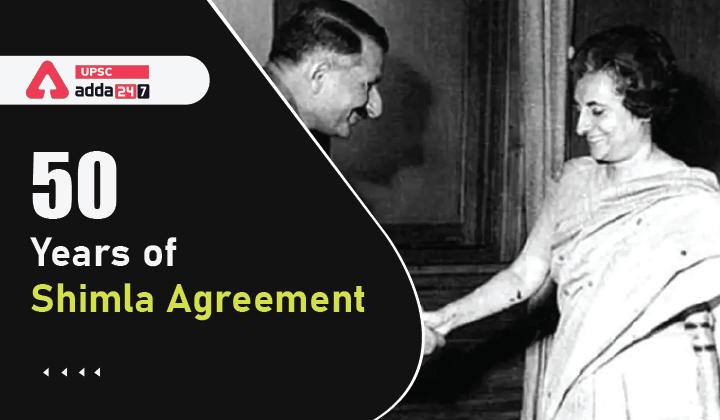Table of Contents
Shimla agreement UPSC: Relevance
- GS 2: Bilateral, regional and global groupings and agreements involving India and/or affecting India’s interests.
Simla agreement: Context
- 2022 marks 50 years of Shimla agreement—a peace treaty signed by India and Pakistan, following the India-Pakistan war of 1971.
What is Simla agreement?
- Shimla agreement or Simla agreement was much more than a peace treaty seeking to reverse the consequences of the 1971 war (i.e. to bring about withdrawals of troops and an exchange of PoWs).
- It was a comprehensive blue print for good neighbourly relations between India and Pakistan.
- Under the Simla Agreement, both countries undertook to abjure conflict and confrontation and to work towards the establishment of durable peace, friendship and cooperation.
Principles of Shimla agreement
- A mutual commitment to the peaceful resolution of all issues through direct bilateral approaches.
- To build the foundations of a cooperative relationship with special focus on people-to-people contacts.
- To uphold the inviolability of the Line of Control in Jammu and Kashmir, which is a most important CBM between India and Pakistan, and a key to durable peace.
Simla agreement clauses
- India Pakistan relations were to be governed by the principles and purposes of the UN Charter.
- Differences between India and Pakistan were to be resolved through peaceful means and bilateral negotiations, neither side can unilaterally change the situation, which might render detrimental to maintaining peaceful and friendly relations.
- Both the countries were to refrain from the threat or use of force against the territorial integrity or political independence of each other.
- Peacefully, respecting each other’s sovereignty, territorial integrity and not interfering in each other’s internal affairs, is to act as a prerequisite to reconciliation, good neighbourliness and peace.
- There must be mutual recognition and honour for each country’s national unity, territorial integrity, political independence, and sovereign equality.
- Both governments were to take steps in their power to prevent hostile propaganda against each other and to encourage spreading such information which would develop friendly relations among India and Pakistan.
Effect of the Shimla agreement
- After the agreement, India returned the 93,000 prisoners of war in an organised manner as Pakistan was to work on converting the Line of Control to an international border.
- India returned the prisoners of war along with the territories that it captured.
- The prisoners of war were mostly militants as well as few civilians, who were mostly women and children.
- There was supposedly a meeting between Bhutto, the then Pakistan PM and Indira Gandhi, the then Indian PM, where Bhutto promised to turn the Line of Control to an International Border although at the time of finalising the Agreement such meeting’s happening was denied.
- There was no mention of the existence of such a meeting.
- Both India and Pakistan were busy focusing on their internal affairs and the promise made by Pakistan was never executed.
Shimla accord: Conclusion
- For the international relations point of view, the Shimla agreement is a perfect example of a bilateral agreement.
- However, it is a failed agreement for India because it could not achieve any of India’s objectives fully, be it maintaining peace or resolving the Kashmir issues.
Read current affairs for UPSC





 TSPSC Group 1 Question Paper 2024, Downl...
TSPSC Group 1 Question Paper 2024, Downl...
 TSPSC Group 1 Answer key 2024 Out, Downl...
TSPSC Group 1 Answer key 2024 Out, Downl...
 UPSC Prelims 2024 Question Paper, Downlo...
UPSC Prelims 2024 Question Paper, Downlo...
